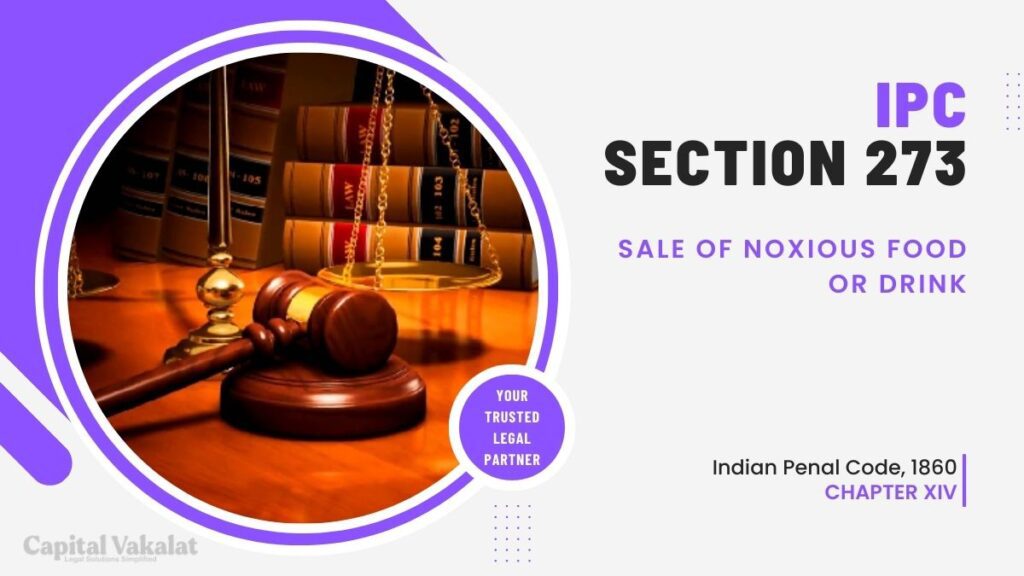In a world where food and beverages play a crucial role in our daily lives, ensuring their safety is of paramount importance. Section 273 of the Indian Penal Code (IPC) addresses this concern by dealing with the sale of noxious food or drink.

In this comprehensive article, we will delve into the specifics of Section 273 IPC, understanding its legal aspects, implications, and the significance of consumer protection in this context.
Introduction to Section 273 of IPC
Section 273 of the IPC is a critical provision that deals with the sale of noxious food or drink. It is an essential part of Indian criminal law and serves as a safeguard for the well-being of consumers. The primary objective of this section is to penalize those who engage in the sale of harmful or adulterated food and drinks, endangering public health.
Understanding the Sale of Noxious Food or Drink
Noxious food or drink refers to items that are harmful to human health when consumed. This can include food and beverages contaminated with poisonous substances, harmful chemicals, or substances that can cause harm, illness, or even death. The sale of such items is a grave offense that can have severe consequences.
Legal Framework and Elements of Section 273 IPC
To understand Section 273 IPC thoroughly, we need to examine its legal framework and the elements that constitute an offense under this section. It is crucial to establish that the accused knowingly or negligently sold noxious food or drink. This implies that the intent to harm is not always required, as even negligence can lead to a violation of this provision.
Penalties and Punishments
The penalties for violating Section 273 of the IPC can be substantial. Those found guilty can face imprisonment for a term that may extend to six months, or they may be required to pay a fine, or both. The severity of the punishment may vary depending on the gravity of the offense and the harm caused to the consumers.
Significance of Consumer Protection
Section 273 IPC serves as a pillar of consumer protection in India. It upholds the rights of consumers to safe and uncontaminated food and beverages. This legal provision encourages businesses to maintain high standards of quality and hygiene in their products, ensuring the well-being of consumers.
Landmark Cases and Precedents
To gain a better understanding of how Section 273 IPC is applied in practice, we can look at landmark cases and precedents. These cases shed light on how the law has evolved over time and the key decisions made by the courts to protect consumers from noxious food or drink.
Preventive Measures for Businesses
Businesses involved in the food and beverage industry must take proactive measures to prevent the sale of noxious items. Implementing robust quality control and hygiene standards, conducting regular inspections, and ensuring product safety can help prevent legal issues and protect consumers.
Reporting and Legal Action
Consumers have a pivotal role to play in the enforcement of Section 273 IPC. If someone suspects that they have consumed noxious food or drink, they should report the incident to the relevant authorities. Prompt reporting can lead to legal action against the offenders, ensuring accountability.
Consumer Rights and Responsibilities
Understanding consumer rights and responsibilities is essential in the context of Section 273 IPC. Consumers have the right to safe and uncontaminated food, and it is their responsibility to be vigilant and report any suspicious or harmful products. Being aware of their rights empowers consumers to make informed choices.
Conclusion
In conclusion, Section 273 of the IPC stands as a safeguard against the sale of noxious food or drink, emphasizing the importance of consumer protection in India. It serves as a deterrent against those who would compromise the health and safety of consumers for their gain. By being aware of this legal provision and actively participating in its enforcement, consumers and businesses can contribute to a safer food and beverage market.
Frequently Asked Questions
Can someone be punished under Section 273 IPC for selling such items unknowingly?
Yes, individuals can be penalized under Section 273 IPC if they sell noxious food or drink knowingly or negligently. Intent to harm is not always required for an offense under this section.
What are the penalties for violating Section 273 IPC?
The penalties for violating Section 273 IPC may include imprisonment for a term that can extend to six months, a fine, or both, depending on the severity of the offense and harm caused to consumers.
How can consumers contribute to the enforcement of Section 273 IPC?
Consumers can contribute by being vigilant, reporting suspicious or harmful products promptly, and understanding their rights and responsibilities in ensuring the safety of food and drinks they consume.
What preventive measures can businesses take to avoid violating Section 273 IPC?
Businesses in the food and beverage industry can implement quality control and hygiene standards, conduct regular inspections, and ensure product safety to prevent the sale of noxious items and protect consumers.